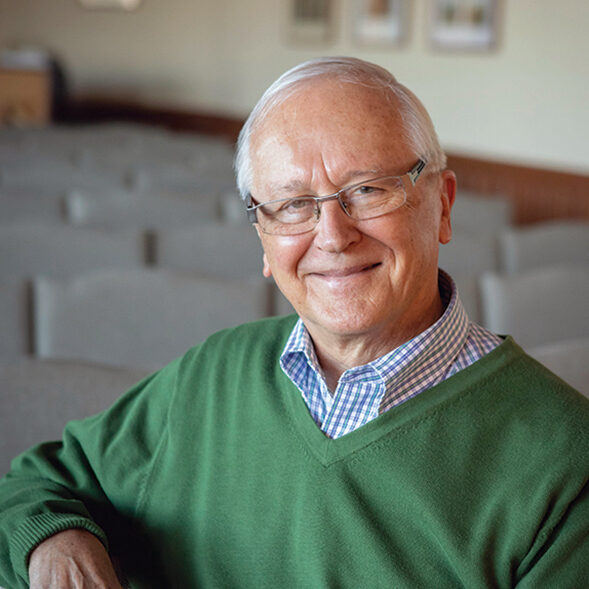 |
“Now these three remain: faith, hope and love” (1 Corinthians 13:13).
He hugged his son and said, “I have faith in you.” And he did. With an important game ahead, he knew his son would do well. His wife said the same thing as he left the house for an important interview. Faith! Such faith is based on what we know about the people who head out the door for new challenges. It’s a projection of our experiences and perhaps our hopes.
For many, faith often is a projection of what they know. On their wedding day, a bride and groom face the future with faith in each other and project what they know of each other into their future life together. As much as we want to know the future, it remains a cloudy unknown, but, like the newlyweds, we face it with confidence based on others, their promises, and our best knowledge of what the future might bring. Faith!
[God’s] promises are not limited by what we see or feel or experience. Faith trusts his promises.
But let’s take one more step into the unknown. What about God? We often say we have faith in God. Almost everyone does. Most search for a foundation for that faith in what they feel or experience. The sunrise, the mountains, the night sky—all are majestic and awe-inspiring. So many conclude that God must be majestic and awe-inspiring. And he is. But think carefully about that faith. It is based on what people can see, experience, feel, or imagine. That faith projects forward.
As we look at the beauty and majesty of nature, we begin to sense something about God’s invisible qualities—his power and divine nature (Romans 1:20). God has left us that little piece of wonder. But it is only a beginning and an invitation so that we “would seek him and perhaps reach out for him and find him” (Acts 17:27). That’s what Paul reminded the Athenians when he spoke of their altar “To An Unknown God” (Act 17). The altar identified the God who had stirred their imaginations and intellect. But it was only a beginning.
Paul encouraged them to look for more. He told them of Jesus, who came to reveal what they couldn’t see. Jesus, the one God sent, rose from the dead as proof of so much more. But that was too much for many Athenians. Resurrection? Impossible! Their faith was tied to what they knew and could comprehend. So they rejected “the more” that God sent Paul to share.
God has not left us drifting in unknown seas. He sent his Son Jesus to tell us what we need to know about his love and promises (Hebrews 1:1,2). He encouraged us to “Listen to him!” (Matthew 17:5). The good news Paul shared is a power that stirs faith in what lies beyond whatever we can prove or see here.
Paul’s message broke through in the hearts of some. They believed! They followed Paul to learn more. By the power of the Holy Spirit, they walked by faith not by sight (2 Corinthians 5:7). The gospel revealed the boundless love of God for flawed and sinful humans. It assured them of forgiveness and promised eternal life. The gospel assured them of what they did not see and made them confident of the hope Jesus promised. That’s what the Bible means by faith (Hebrews 11:1).
As Lutheran Christians, we know such faith—by grace through faith we are saved. Faith trusts the gifts God freely offers us. His promises are not limited by what we see or feel or experience. Faith trusts his promises. Then we confidently walk by faith, not sight.
Author: John Braun
Volume 109, Number 10
Issue: October 2022
- We have love
- We have hope
- We have faith
- I come
- Love one another
- Palmetto palms and wrens
- Fathers
- Mother’s Day
- Believe the Word
- The Judas priority
- In Christ
- A thought: Mary
- Come, Lord Jesus!
- A thought: Here we stand!
- A thought: Obedience
- A thought: Hope
- A thought: Almighty God
- A thought: Scripture alone
- A thought: Their message to us
- A thought: The Ides of March
- A thought: The path of the righteous
- A thought: The Bible still matters
- A thought: Happy birthday, Brother!
- A thought: Change
- A thought: Our Father
- A thought: The difference
- A thought: Imperfect world, imperfect life
- A thought: Joy and peace today and everyday
- A thought: Good job!
- In God’s hands
- A thought: Outing death
- A thought: The Christ
- A thought: Trusting what we cannot see
- A thought: Partners
- Heirs of heaven
- Hope
- The Avengers and two lions
- Faith in Jesus
- God’s policy of love
- Lord, have mercy!
- Light in the darkness
- Why?
- The shroud
- A Lutheran Lent
- Where is God?
- Turning pages







